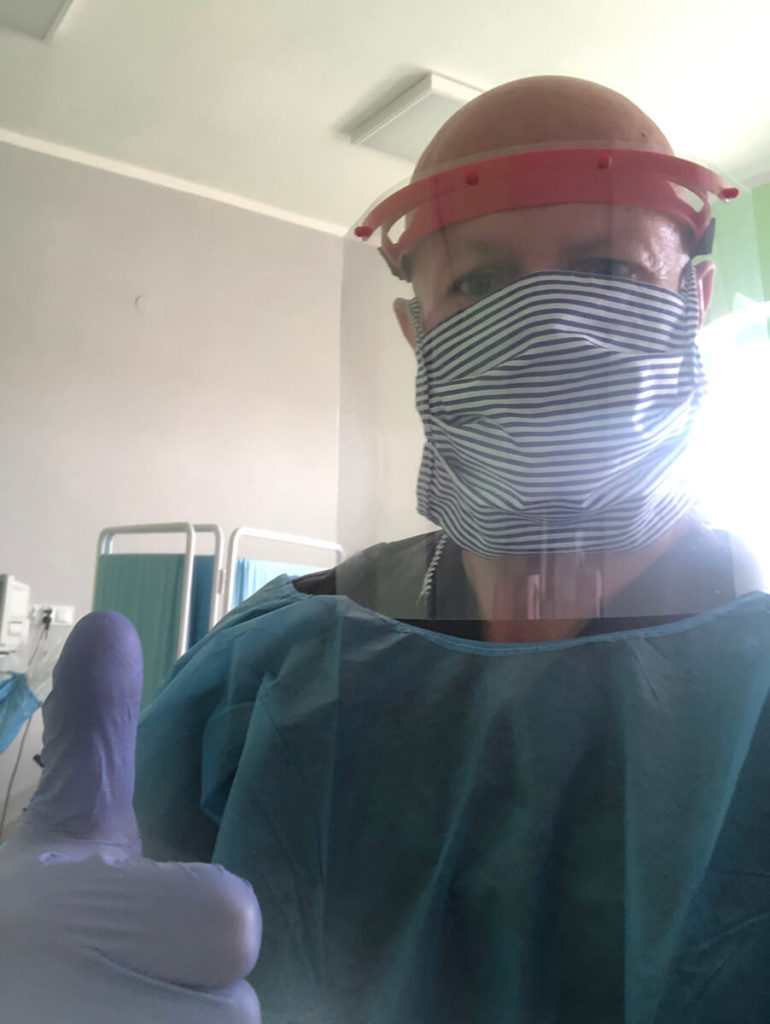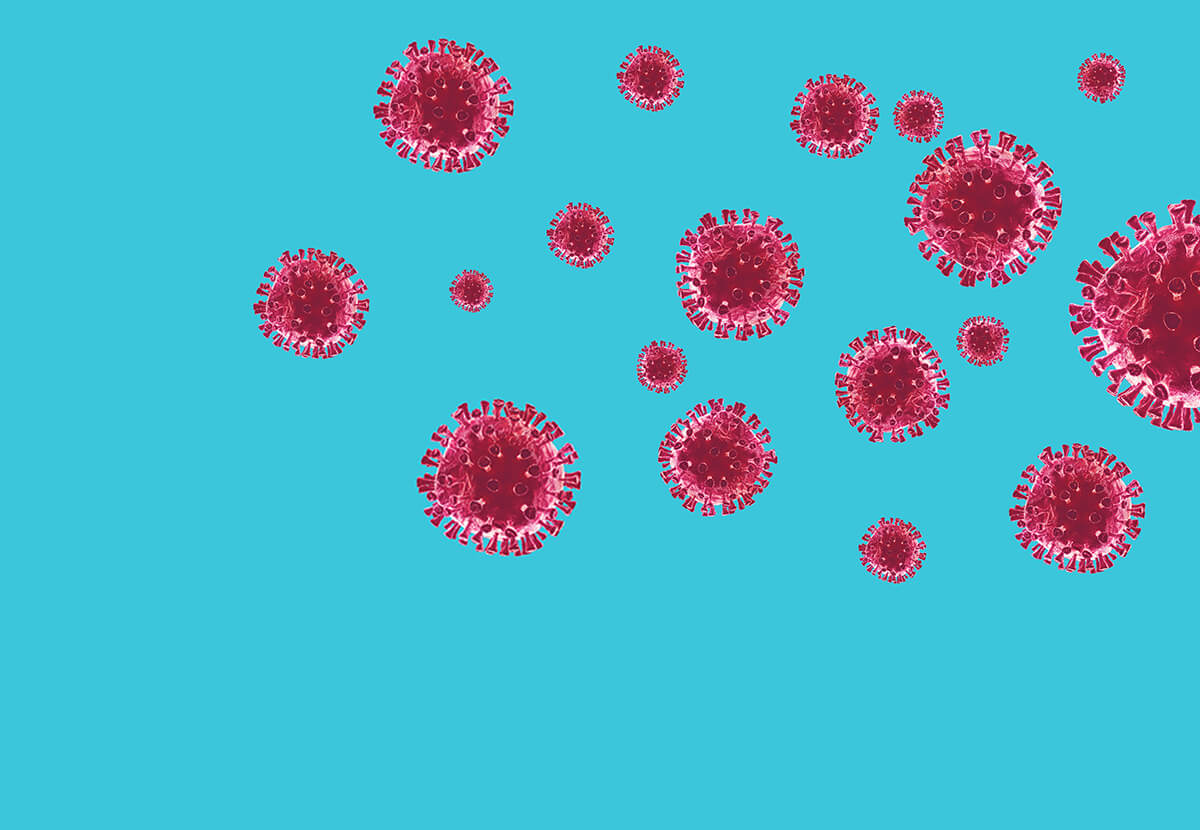Redaktor "Głosu Fizjoterapeuty"
In Brzeg we have a department of neurological rehabilitation which can accommodate 25 patients. Around 80% of our patients have suffered a stroke, the rest of them have undergone neurosurgical procedures, craniocerebral trauma or trepanation due to hemorrhagic stroke. Furthermore, after a long time of preparations, we have opened a six-bed subdivision of rehabilitation for adult patients in coma in March this year. We therefore possess a lot of experience in working with patients with serious immunodeficiencies or infected by alert pathogens. These procedures have been implemented for years. I always say that there is no problem if we know our enemy, i.e. what type of pathogen are we fighting with. May it even be the worst one – but we still can adequately prepare for the fight. The situation changes diametrically when we have no idea what our enemy is like.

Dariusz Banik – Master of motor rehabilitation sciences, physiotherapy specialist. Completed post-graduate studies in pedagogy and management in health services. Coordinator of the physiotherapy team, chief of the Department of the Systemic Day Rehabilitation and Outpatient Physiotherapy in Brzeskie Medical Center. Representative of Opole Voivodeship in the KIF board.
Unknown enemy
At the beginning of March we started admitting patients from facilities in which – as it later turned out – coronavirus infections were confirmed. At that time the patients were not even diagnosed, we did not have any legal possibilities of testing them, so we were unaware what they were truly coming with. Everything was very chaotic. I think that none of us expected the coronavirus to ever affect us here in Poland, when we watched TV coverages from China. But when the virus finally reached Europe, during morning briefings we often said things like: “Oh dear, if the virus spreads to Poland, we will not manage, we are not prepared at all”. That was when we started acting – the hospital director began looking for masks and other elements of protective equipment. But even then some equipment was already missing and – as a hospital, as employees – we were left alone. We had a small number of aseptic and antiseptic agents which could only be used for coma patients. I spent the first weeks calling people, charities and friends who might knew someone, who knew someone who could make us protective visors, masks or maybe bring some disinfectants. I organized these actions by phone or on the Internet. My day started and ended with calling people and asking for help, because we really had nothing at that time.
We had to reorganize our department very quickly, which actually was not new to us, since we have already had some experience in closing a department, e.g. during flu season. However, it looked a bit different this time. We limited the maximum amount of people who could stay in the same room to two. We started monitoring our staff on a daily basis. Some of our colleagues resigned from their jobs for a variety of reasons, including fear for their children and having to take care of them, as well as reasons regarding their parents, with whom they live. The ones who stayed were divided into shifts, in order to prevent as many physical contacts as possible. However, we still had to exchange information about patients, so some contact was necessary. We stopped organizing bigger briefings for safety reasons.
Fear
When we first saw what happened in other healthcare facilities, we were overwhelmed by fear – for our patients, ourselves and our families. The fear VOICE OF PHYSIOTHERAPIST – SPECIAL EDITION 35 moved outside of hospital, to our homes. At first, when I came home from work, my family used to yell: “Jump in the bathtub and do not touch anything!”. Today my family members know that I go straight under the shower to thoroughly clean myself and I take off all the clothes I wore in the hospital. But before that even my child was scared… It sure was not easy. I am laughing at this now but I often used to stand under the shower and wonder whether I was doing the right thing by coming home from work. I thought that maybe I should have looked for another solution.
When we received information about a patient transferred to us from a ward with coronavirus transmission, it happened several times that some of us showed up at work packed in case we too tested positive for SARS-CoV-2. We were prepared for the perspective of not leaving the hospital. It was really difficult. Nonetheless, we are now beginning to get used to these circumstances. We are aware that all of this is going to take long. I believe that all physiotherapists who did not leave their patients during the epidemic deserve a low bow.
Patients suffer alone
Plans to open a coma subdivision appeared four years ago. The process of organizing, training, reconstructing the department and equipping it lasted until February. There was a big opening planned for the beginning of March but due to the epidemic it could not take place. It all came down to a meeting of staff and director. On the next day we were already admitting the first patient who had been waiting for this opportunity in the Opole ICU. We receive several dozen phone calls from families every day. We truly were afraid to open a department at that time – but these are no accidental patients who present only mild symptoms. These people really need us.
Unfortunately, the only contact that coma patients have with their families is by phone, Skype or when their family records a voice message and sends it to us, so that we can play it by the patient’s bed. The fact that contact with family is one of key elements in treating coma patients makes this even more tragic. The voice and touch of loved ones are crucial in regaining consciousness and coming back to life. But when this voice is played on some electronic device, it loses its power. And nothing compares to the touch of a loved person.
Prolonging lack of contact with families is also difficult for our neurological patients. When we closed our department before during flu season, it only lasted two, tops three weeks. Now it has been almost two months. We are witnessing incredibly difficult situations, for example when we drive our patients up to the glass window, so that they can see their loved ones and talk on the phone while looking at each other. They touch the window, as if they wanted to touch the hands of their family members. Meetings like that get very emotional on both sides… It is hard, really hard.
We need to take care of ourselves
As we are slowly beginning to control our fear of the disease itself, we start to be scared of something else – legal consequences. More and more opinions appear on the internet, saying that if a patient gets infected by, God forbid, someone from the healthcare staff, we will not be able to defend ourselves in the court. The director of our hospital promises that he will always stand on our side… but will his support be enough? Moreover, such a situation would be very stressful for any of us. There is no law regulation which presumes that we approach the patient in order to help, not harm – but there is always a risk that something may go wrong.
We decided to do the tests on our own, just in case. We payed for immunological tests from our own pockets, since we cannot receive a free test unless we prove that we had contact with an infected patient. W ordered the test because we care for our own health and the health of our families and patients. However, the fear grows as we wait for the results – if it turns out that somebody is infected, they will lock us down.
We try to support each other as physiotherapists, for example by texting on chat groups. We now contact each other that way much more often than in person. We promise each other that we will throw a huge party as soon as all of this ends. Of course no one probably thinks about it now, but I am sure people will seriously need to unwind after these few weeks or months…
The worst evenings are when the brain calms down for a little while, and then suddenly thousands of thoughts pop up in your head – you start thinking about dangers, analyze the situation, try to sort things out. You reflect on what could be improved, how to minimize the risk, how is the rest of the staff doing, how are the patients? Easter holiday was extremely difficult, I had to come and help despite my days off, because I hated to think that these patients were completely alone, immobilized. But if somebody chose this profession, he/she has to truly love it.
Daj znać, co sądzisz o tym artykule :)
Redaktor "Głosu Fizjoterapeuty"




